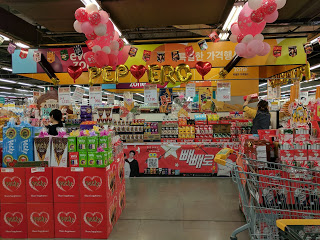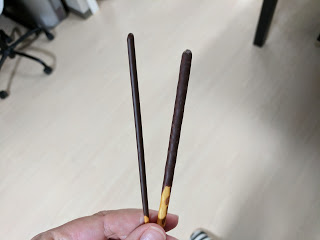Happy Belated Pepero Day!
Yesterday was Pepero Day here in South Korea – a holiday, like many holidays, devoted to sweets.
What is Pepero? Pepero is a chocolate-covered pretzel stick candy snack made by Lotte Confectionery, a division of Lotte Group (one of the country’s powerful chaebols*). It is similar to Japan’s Pocky snack. In fact, it’s a bit too similar. Pocky debuted in the 1960’s, and in 1983 Lotte began selling Pepero. Ezaki Glico (makers of Pocky) tried to sue Lotte for stealing their product – something Lotte insists it did not do – but since Pocky was not available in South Korea at the time, apparently they were unable to do this. (They have since found other excuses to sue Lotte, however.)
Things became even more maddening for Glico when, according to Lotte’s marketing ploy legend, two Korean schoolgirls exchanged boxes of Pepero on November 11 in hopes of becoming tall and thin, like a Pepero stick. November 11 was chosen because it looks like a bunch of Pepero sticks: 11/11.

Somehow, this Pepero gift exchange caught on and spread throughout Korea. Lotte naturally jumped on this opportunity, and in 1997 began marketing Pepero Day as a kind of Valentine’s Day for more than just couples (though it’s pretty couple-oriented, as well). And it worked! Today, Lotte Confectionery makes half its annual sales on Pepero Day. All the major department stores and grocery chains put up Pepero Day displays, and K-pop stars hawk the candy in posters and advertisements.

Glico was… let’s say, annoyed. They invented the candy, but did not get to enjoy either their own product holiday or the ballooning sales that came with it. (I like to imagine some Glico executive snapping Pepero in his fingers and throwing them down on a boardroom table before a bunch of sheepish minions, but, being Japan, it’s doubtful this would occur.) So, Glico decided to make it happen. They began heavily advertising “Pocky and Pretz Day” in Japan (Pretz is Pocky’s naked cousin) in a veritable media blitz. Think: Doki Doki Pocky Roulette; Pocky Rockets; national dance contests; skydivers dropping giant Pocky onto a target on the ground… They even promoted several social media stunts and wound up putting themselves in the Guinness Book of World Records for “Largest Online Photo Montage of Cookies/Biscuits” and “Most Mentions of a Brand Name on Twitter in 24 Hours.”
Some believe, in an ironic twist of the you-steal-we-steal Pepero vs Pocky Day rivalry, that Pocky Day in Japan only became popular because the Korean Wave** had made Japanese people familiar with Pepero Day.
Oh, well. Profits are profits, and everybody wants an excuse to eat candy, right?

*A chaebol is one of the family-run business conglomerates that traditionally enjoyed government support and a near-untouchable status in South Korea. (I’ll try to post more about them later.) Lotte is the country’s 5th largest conglomerate. Its empire spans everything from candy and beer to department stores and hotels, and its founding and ruling family is currently involved in so. much. drama. Founder and 94-year-old patriarch Shin Kyuk-ho was ousted by his younger son in 2015. Older son and heir apparent Shin Dong-joo has been feuding with his younger brother over control of the company since Shin Dong-bin usurped chairmanship after successfully expanding Lotte. When their feud became public the government began investigating the group, and last March all three Shins were indicted for tax evasion, financial scams, and embezzlement. Oh, and sister was already in jail for embezzlement and breach of trust.
**”Korean Wave” refers to the spreading popularity of Korean culture around Asia and the world, thanks to trendy K-pop girl/boy bands and K-dramas. I once read that it was actually a government scheme to gain support for South Korea, since they needed regional goodwill on their side due to the ongoing conflict with North Korea.
And lastly… which is better? Pocky or Pepero?


